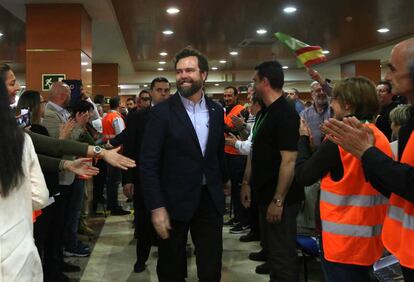Spain’s far-right party Vox takes its anti-immigration message to Madrid
Leaders are holding rallies in low-income towns with large foreign populations in the hopes of replicating their recent success in Andalusia at upcoming elections

Vox, a Spanish far-right party that recently gained parliamentary representation in the southern region of Andalusia, is trying to extend its successful strategy ahead of local, regional and national elections due to be held in the spring.
After securing 12 seats in Andalusia on December 2 on a pro-Spanish unity and anti-immigration message, Vox got an early start on its campaign for regional and municipal elections in Madrid with a Sunday rally in Torrejón de Ardoz.
Don’t you ever forget it. Vox is the storm
Iván Espinosa de los Monteros
The choice of venue was not casual: a hotel located a five-minute drive from one of the Madrid region’s most diverse neighborhoods, San José, where halal butcher shops share sidewalk space with Senegalese hairdresser salons and Ukrainian supermarkets.
It was the first of six locations in the region where Vox will be holding rallies in the coming days and weeks, as the country prepares for a flurry of voting activity. On May 26, Spaniards will cast their ballots in municipal, regional and European elections, and Prime Minister Pedro Sánchez on Friday announced a snap general election for April 28 after failing to get Congress to support his budget plan.
Vox’s choice of locations in Madrid is the result of lessons learned from the Andalusian election, where the party attracted nearly 400,000 votes (11% of the total), many of them in municipalities with large numbers of non-EU foreign residents, such as El Ejido, Algeciras or Níjar.

Four of the towns where the far-right party is holding rallies – Arganda del Rey, Parla, Collado Villalba and Torrejón de Ardoz – happen to be on the list of 10 Madrid municipalities with the highest percentage of immigrants, according to an analysis conducted by EL PAÍS. Móstoles and Colmenar Viejo are also on Vox’s list.
These are all low-income towns where many residents typically vote for the Socialist Party (PSOE) and the anti-austerity party Podemos, and they have little in common with the wealthy municipalities where Vox obtained its best results at the 2015 elections – places like Pozuelo, Majadahonda or Las Rozas, where voters lean to the right.
At last Sunday’s event in Torrejón, 800 supporters filled the auditorium at Hotel Aída to hear two Vox leaders who, according to party sources, will probably run in Madrid’s local and regional elections. They are Iván Espinosa de los Monteros and Rocío Monasterio, a married couple who claim that they “love to go to difficult places.”
But voters in Torrejón, which is run by the conservative Popular Party (PP), will not be as difficult to convince as those in Parla or Móstoles, two traditional bastions of the left.
Rafael Romero, 79
In Torrejón, a municipality of 129,729 residents located northeast of Madrid along the so-called Corredor del Henares, there is no significant tension between local and foreign-born communities, according to several residents. Some expressed surprise at the fact that Vox came to town at all.
“My kids go to school with immigrant children, and the relationship is good,” says Ana Isabel Oliver, 39. Others who declined to provide their names said that “there are barely any Torrejón-born people left” in the neighborhood of San José because the latter sold their apartments and moved away when the migrants arrived.
At the rally, the speakers drew the greatest applause when they described undocumented migrants as people who live off social aid, despite numerous studies that show they pay more in taxes than what they receive in public benefits.

“This is not xenophobia. Are you xenophobic?” asked Espinosa de los Monteros as he addressed the audience. He also proposed no longer taking in Syrian refugees and instead favoring people fleeing leftist regimes in Latin America, chiefly in Cuba, Venezuela and Nicaragua.
The crowd clearly appreciated the tone. “They tell it like it is,” said Víctor, who declined to give his last name. This was the first political rally for him and his wife Carmen.
They were not the only ones. At one point during the rally, Espinosa de los Monteros asked people to raise their hand if they had ever been to a political event before, and only a handful did so.
Rafael Romero, 79, took a one-hour bus trip from the Manuel Becerra neighborhood of Madrid to be here for the rally. “Vox is different from traditional parties,” he said.
Vox leaders believe they can draw voters away from the left, but many of those present at the Torrejón rally were disillusioned Popular Party (PP) voters like Antonio Villar, a card-carrying member who stood in line to get his picture taken with the Vox speakers. Villar, who lives in the neighboring town of Alcalá de Henares, has watched Vox grow into what it is today: “It’s really exciting. Two years ago there was just a handful of us who would get together at a bar, and now there isn’t enough room for all of us in here.”
Vox is still on the lookout for candidates to run in the 179 municipalities that make up the Madrid region. Some of these places don’t even have party coordinators yet. But the leaders are not worrying about that. They say that introducing the candidates is not so important, because they are moved forward by a powerful force. Before ending the rally with a “Viva España!” Espinosa de los Monteros slipped in the following piece of advice: “Don’t you ever forget it. Vox is the storm.”
English version by Susana Urra.
Tu suscripción se está usando en otro dispositivo
¿Quieres añadir otro usuario a tu suscripción?
Si continúas leyendo en este dispositivo, no se podrá leer en el otro.
FlechaTu suscripción se está usando en otro dispositivo y solo puedes acceder a EL PAÍS desde un dispositivo a la vez.
Si quieres compartir tu cuenta, cambia tu suscripción a la modalidad Premium, así podrás añadir otro usuario. Cada uno accederá con su propia cuenta de email, lo que os permitirá personalizar vuestra experiencia en EL PAÍS.
¿Tienes una suscripción de empresa? Accede aquí para contratar más cuentas.
En el caso de no saber quién está usando tu cuenta, te recomendamos cambiar tu contraseña aquí.
Si decides continuar compartiendo tu cuenta, este mensaje se mostrará en tu dispositivo y en el de la otra persona que está usando tu cuenta de forma indefinida, afectando a tu experiencia de lectura. Puedes consultar aquí los términos y condiciones de la suscripción digital.








































